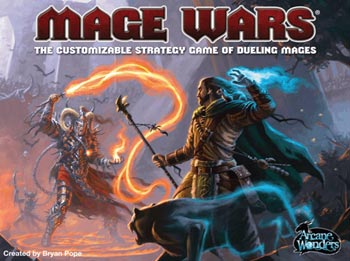

The archetypical Sorcerer’s Apprentice, staring up with mixed wonder and terror at their master’s tower piercing the dark clouds above. The rules entreat you to start with apprentice mode and that’s what I felt like looking the game over. Playing Mage wars does add astonishing amounts of time and complexity to the proceedings.

And it turns out the stock answer is half correct. That didn’t put off the designers of Mage Wars though, who seem to be intent on proving the naysayers wrong by making a working sandbox into which you could chuck the kitchen sink of theoretical Magic variants and see what happened. They’d add too much time and complexity for the interest they added to the game. Of the people who’ve entertained either question, I believe that the majority rapidly dismissed them as being unworkable. Because in Mage Wars you don’t get a bigger hand, or control over the draw, you can pick whatever you like from your entire deck each and every turn. Mage Wars addresses that problem too, with swaggering overkill. You don’t need to wonder any more because that, effectively, is what you get in Mage Wars.įurthermore, I suspect that anyone who ever played Magic: the Gathering more than once has, at some point, been so annoyed by rubbish card draws that they pondered on a variant where you could have a bigger hand, or more control over the draw. I’ll wager that anyone who ever played Magic: the Gathering more than once has, at some point, wondered how great it would be if creatures weren’t just static lines of attack and defense, but actively engaged in tactical manoeuvre.


 0 kommentar(er)
0 kommentar(er)
